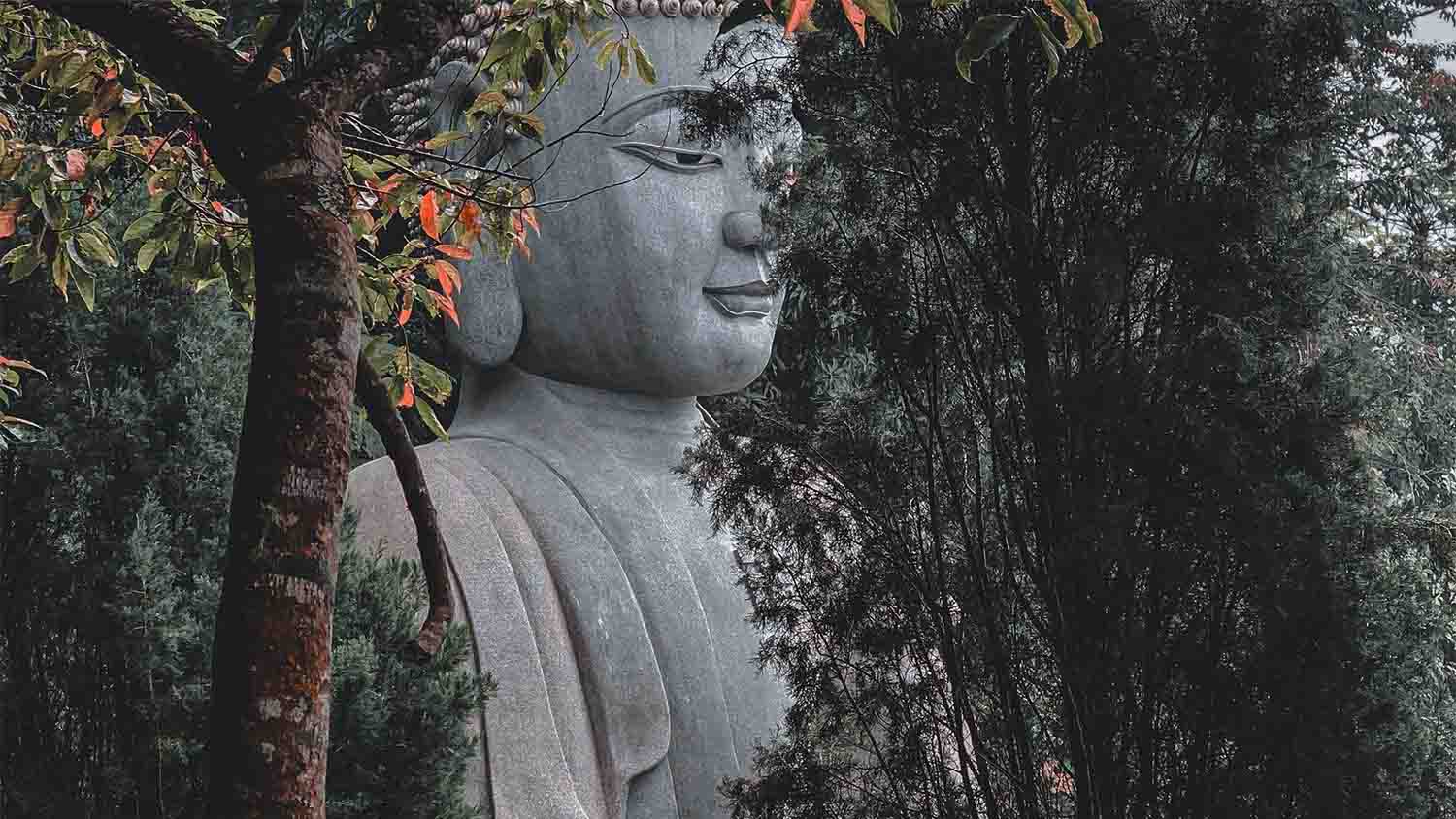Reading time: 9 minutes
Sometimes when one is lost, it’s helpful to pull out a map. In this article, I’m going to provide such a map because modern society is filled with so many options for spiritual life and such a plurality of Goods, it’s helpful to know where you’re going. We are all self-creating ourself, and it’s no wonder that—as I saw today—one of the most popular articles in the Atlantic is about Why so many Americans are Turning to Buddhism . . .
Perhaps Buddhism is popular because it poses a Middle Way – which I will describe in more detail later on. But what most people don’t recognize is that what is being called Buddhism right now has actually been in our midst since before the French Revolution in the form of a philosophical movement called Deism.
Deism grew out of the Church’s response to the rising power of science in the seventeenth and eighteenth centuries. Losing power, the Church needed to retain its legitimacy and authority over an emboldened secular, merchant, market-driven society. But to understand this turn of events, let’s take a whirlwind tour of history.
In the Middle Ages, the highest philosophy was articulated by Thomas Aquinas who thoroughly integrated classical, Aristotelian thought with Christianity, and who offered an integrated world view that assigned every living creature a place in what was called the Great Chain of Being. But, that order began to fall apart due to people like Francis Bacon, Petrarch, and Erasmus. The traditions that imbued Medieval institutions with their authority, gave way to more progressive, humanitarian, individualistic ideals, especially of equality and liberty.
Indeed, the modern notion of the self as we know it was not born until the seventeenth century. However, once that sense of self grew up through thinkers like Descartes, Hobbes, Locke, Rousseau, and others, a whole host of problems appeared. For example, if the self is self-governing as a rational being (as Kant said) it follows that one is free to determine one’s own destiny and way in society. The Church—which had previously guided a life by virtue of its understanding of the world and natural order—no longer had the exclusive rites to universal knowledge, which had now been democratized and usurped by science. This, goaded on by the Protestant Reformation, emboldened individuals to begin to think that they were masters of their own destiny – or at least should be, to demonstrate by wealth and status, the favor of God. Thus part one.
Part two is that it’s lonely to be an individual in the mechanical clock-like universe of Newtonian Physics. And there were two camps for dealing with this cold, lonely feeling.
One camp held that we still have needs for connection with something higher and more meaningful – a spiritual dimension to life other than physical pleasure. These people still exist, and you can find them all over the place. Perhaps you are one. If you say things like “The Universe is helping me,” or “This must be what the Universe wants,” or “I’m spiritual but not religious,” then you fall into this camp. This position is called theism.
On the other hand, there is atheism. Atheists are happy to say that bodily pleasure is enough, and that it makes no sense to live with, or for, higher ideals — or, more sophisticatedly, as Marx, Freud, and Nietzsche (and more contemporarily, by Horkheimer and Adorno who in their book Dialectic of Enlightenment roll all three into one) might say – that higher ideals are merely created by physical demands, and that ideals only exist to ameliorate disgruntled workers so that society can function well and people can get along.
To be clear, I think that both views have a point, and both views have developed and dominated at various times and in various pockets of our (Western) history and civilization. They have been called Romanticism and Rationalism.
Eventually however, both of these ways reached a dead end (Romanticism in the form of Totalitarian regimes and Rationalism in the form of unenlightened Capitalism), and we came to Existentialism, which reached its own dead end because of its limited concept of the self, or mind.
Since then, with people like Jung (via Freud) we have tried to expand our notion of mind using such concepts as the collective unconscious, and more recently, New Age notions like the Akashik Field, or in physical science’s notions of things like unified field theory, and now, most recently, the resurging popularity of psychedelics. In short, we are looking for a common unifying value that we lost when Nietzsche declared that God is Dead. What he meant was that the absolute value that unified our common interests as humans was gone.
After Existentialism failed we turned to Pragmatism, most recently through philosophers like Richard Rorty, on the one hand, and on the other, for the spiritually-minded, the Human Potential movement, through people like Karen Horney, Rollo May, Viktor Frankl, Carl Rogers, and Abraham Maslow, who established much of the groundwork for developments like Positive Psychology, which I wrote about last year. In addition, we have combined the pragmatic view with an almost religious faith in technology. We think, for example, that AI and Big Tech will solve our problems with meditation apps and other practical solutions for Designing Your Life (literally the name that two Stanford professors came up with for their coaching program – as though we, and our lives, are products to be designed. Thus contemporary expressions of pragmatism.)
The biggest dilemma right now, however, is that all of our systems and models for work are based on certain ideas, philosophies, and principles that grew up during a massive period of industrialization in which the goals of society were to increase GDP, and this focus has given rise to our love for the stability of corporations which provide a host of benefits to keep us happy, productive, and profitable workers. (There are now, however, efforts – especially in the UAE and New Zealand to develop GHI – Gross Happiness Indexes – another pragmatic solution that looks at qualitative indicators as opposed to merely quantitative ones as important social and political assets.)
But we are seeing that there is a cost to our industrial, corporate growth, because corporate profits are not being well distributed throughout society, so fewer people benefit from them. Thus, though, as Stephen Pinker says, there is plenty to go around, the majority of people in Western Civilization are more anxious, less happy, increasingly unhealthy, and birth rates are dropping. So, hopefully, we are due for some readjustments.
Many of the people with whom I work in a coaching capacity are ahead of this curve. I admire them very much because they realize that something isn’t right, and they want to change their lives to live better and to take care of themselves in a way conventional approaches and systems fail to.
Also, because these people have come to realize that the reason conventional systems fail is because corporate interests, including schools and government, do not have them, their unique talents and gifts, or their lives or particular circumstances or any of the best parts of them, as their main concern. (Or if they do, the main concern of social systems is to secure them as a client, or consumer, for profit as an end in itself — as Weber pointed out in his analysis of the relationship between capitalism and the protestant work ethic).
This mutually beneficial relationship for the sake of blind profit is a hallmark premise of modern secular society. We all give to get something to further our personally determined interests – usually not very deeply considered ones (see below) — the fulfillment of which, we believe will make us happy.
How then, do we find our way in all this? Enter Buddhism. Buddhism appeals to people right now for several reasons:
1. It does not conflict with science.
2. It is pragmatic and seeks to find a middle way between living a comfortable material existence with intellectual and spiritual content.
3. We have been primed for such an approach by the Human Potential Movement, which holds out a vision for human creatures as being self actualized when we demonstrate our transcendence of survival worries for more elevated concerns and traits, including: acceptance, authenticity, equanimity, purpose, efficient perception of reality, humanitarianism, peak experiences, good moral intuition, and creative spirit. And it’s in light of these values that some even herald our current age as one of The Next Enlightenment.
4. Buddhism is also, by virtue of its sophisticated theology, simultaneously holistic and dualistic, which is a fancy way of saying that it’s able to address our need for oceanic, transcendent human experience, as well as concrete day-to-day ordinary life, lived in historical, chronological time. Unfortunately, though, Buddhism is entirely misunderstood, and inaccessible to most Americans and easterners by virtue of the very mindset that has them seek it out, namely, self-actualization. The reason is because in Buddhism the active ingredient, if you want to call it that, is other-actualization. In short, meditation for Buddhism means to meditate and constantly hold in mind how it is that your life can be used to help enlighten others, and to be honest about that in terms of the level of your own situation and understanding. This, unfortunately, is an extremely difficult thing for a human to do, and there are scientific reasons for its difficulty.
Left to ourselves, the human default is not a nice one. Science shows us, for example, that we have several fairly bad traits that need to be overcome:
1. We view minorities and the vulnerable as less than human (can you say populism and immigrant crisis in Europe?)
2. We experience schadenfreude (pleasure at another person’s distress) by the age of four.
3. We believe in karma – (assuming that the downtrodden of the world deserve their fate.)
4. We are blinkered and dogmatic.
5. We would rather electrocute ourselves than spend time in our own thoughts (Is it any wonder that we’re reaching for our iPhone, workaholic, and addicted to social media?)
6. We are vain and overconfident.
7. We are moral hypocrites.
8. We are all potential trolls.
9. We favor ineffective leaders with psychopathic traits.
10. We are sexually attracted to people with dark personality traits. (Women more strongly attracted to narcissistic men’s faces tend to have more children – Yikes!)
So, as you can see, we have a lot of work to do. Before the planet’s temperature goes up 41 degrees Fahrenheit, which will cause us to lose clouds, let’s start to take a serious look at where we are, who we are, where we’re headed, and figure out, using our brains, how to get there, but, perhaps more importantly, how to get there while helping others do the same.






